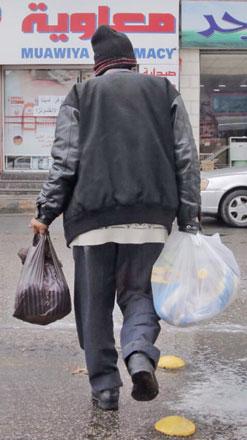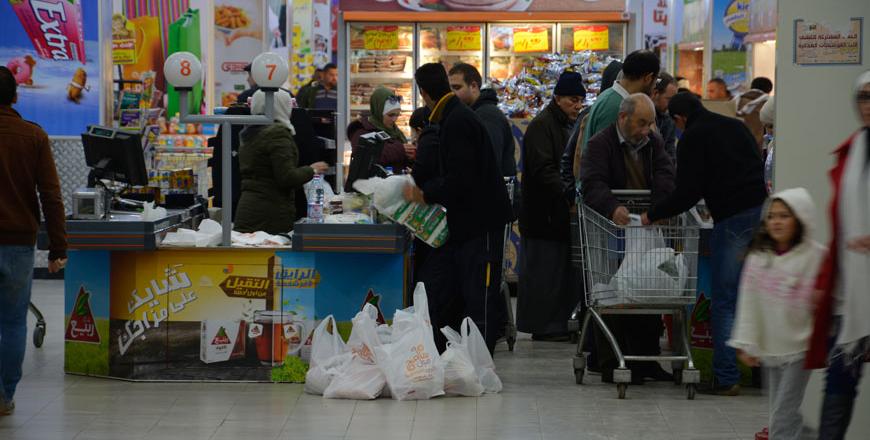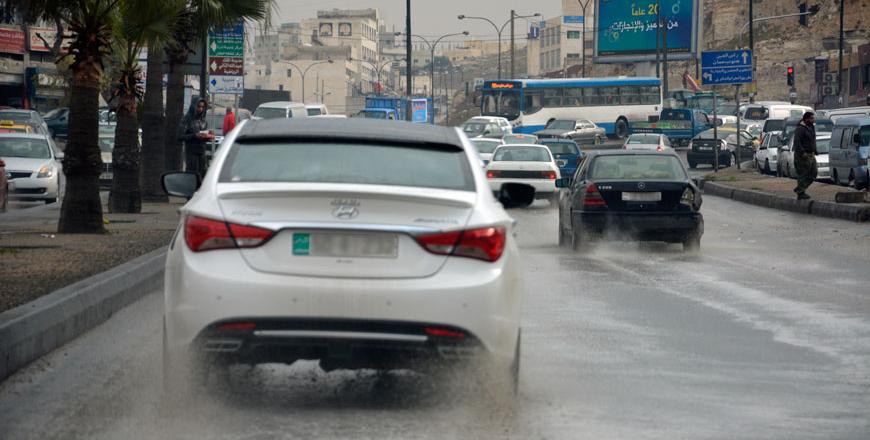You are here
Citizens stock up on food ahead of expected polar front
By Hana Namrouqa - Jan 18,2018 - Last updated at Jan 18,2018

Bakeries and groceries on Thursday reported a 100 per cent increase in demand for bread and basic food supplies despite the Jordan Meteorological Department’s announcement that the impact of the polar front and its accompanying strong depression on the Kingdom will be ‘swift’ (Photo by Osama Aqarbeh)
AMMAN — A polar front forecast to bring heavy rain and snow to high altitudes started affecting the Kingdom on Thursday, prompting people to stock up on bread and basic food commodities, according to authorities.
Bakeries and groceries on Thursday reported a 100 per cent increase in demand for bread and basic food supplies despite the Jordan Meteorological Department’s (JMD) announcement that the impact of the polar front and its accompanying strong depression on the Kingdom will be “swift.”
“The combined weather condition started affecting the country on Thursday, with strong winds and heavy rain expected to start prevailing as of Thursday evening and snow over high-altitude areas before Friday dawn,” head of weather forecast section at the JMD Raed Rafed told The Jordan Times.
Snowfall on early Friday is forecast for the mountains of Karak, Tafileh, Shoubak and Ras Al Nakab in the south, the hilly areas of Ajloun in the north and the mountains in the central region.
“Snow in the central region on Friday is not expected to cause daily life disruptions,” Rafed stressed.
Despite the JMD’s daily updates on the impact of combined weather condition and the areas which will witness snowfall, people started preparing for the weather condition as of mid week, according to food outlets and bakeries.
Bakery Owners Association President Abdul Ilah Hamawi said that demand for bread increased by 50 per cent on Wednesday, and quickly increased to 100 per cent by Thursday morning.
“Bakeries use 2,000 tonnes of flour every day, but Thursday, the amount doubled to 4,000 tonnes. In addition, sales of crackers and pastries increased,” Hamawi told The Jordan Times.
He underlined that turnout at bakeries always surges whenever extreme weather is forecast.
“It is only normal for people to stock up on food — and bread primarily — when there’s cold and extreme weather approaching. People tend to avoid going outdoors when there’s heavy rain or snow,” Hamawi said.
Meanwhile, Abdul Rahim Abu Hussein, manager of a groceries store near the Sports City area, said that his sales increased this week, but only for certain food items “locally associated with the cold weather”.
“Many people are buying ingredients of hot drinks such as cocoa and sahlab as well as nuts and seeds. Also, demand for winter fruits and vegetables increased yesterday and today, such as sweet potato, chestnuts, corn and citrus fruits,” Abu Hussein said.
The JMD said that the polar front and the depression will cause temperatures to drop by 7ºC below their annual average for this time of the year (12ºC).
While Rafed highlighted that the depression will be the hardest to affect the country this winter in terms of wind speed and temperatures, he underscored that it will only affect the country on Thursday night and taper off on Friday afternoon.
“Its impact will be quick and is expected to ease off starting Friday noon. The weather will start to stabilise as of Friday night,” Rafed highlighted.
President of owners of fuel and gas stations syndicate, Nahar Seidat, said on Thursday that demand for gas cylinders, gasoline and fuel has increased by 100 per cent in light of news on a strong depression affecting the country.
Seidat said that the syndicate has coordinated with the Jordan Petroleum Refinery to extend the working hours of gas cylinders stations.
The gas cylinders’ stations in Amman, Zarqa and Irbid will be working today around the hour to produce more gas cylinders to avoid any shortage during the cold weather this weekend.
“Priority in distribution of gas cylinders and fuel derivatives will be to remote areas and also areas where snow accumulation is expected,” Seidat told The Jordan Times.
The syndicate’s president underlined that enough amounts of fuel derivatives and gas cylinders will be available during the expected rough weather.
Related Articles
AMMAN — While the cold front that started affecting the Kingdom on Thursday has increased demand on fuel, the demand for food items remained
AMMAN — The magnitude of a depression and a cold polar front forecast to affect the country on Saturday will be weaker than what was announc
AMMAN — A polar front is expected to affect the Kingdom on Thursday, bringing heavy rain and snow and causing temperatures to dip well below


















